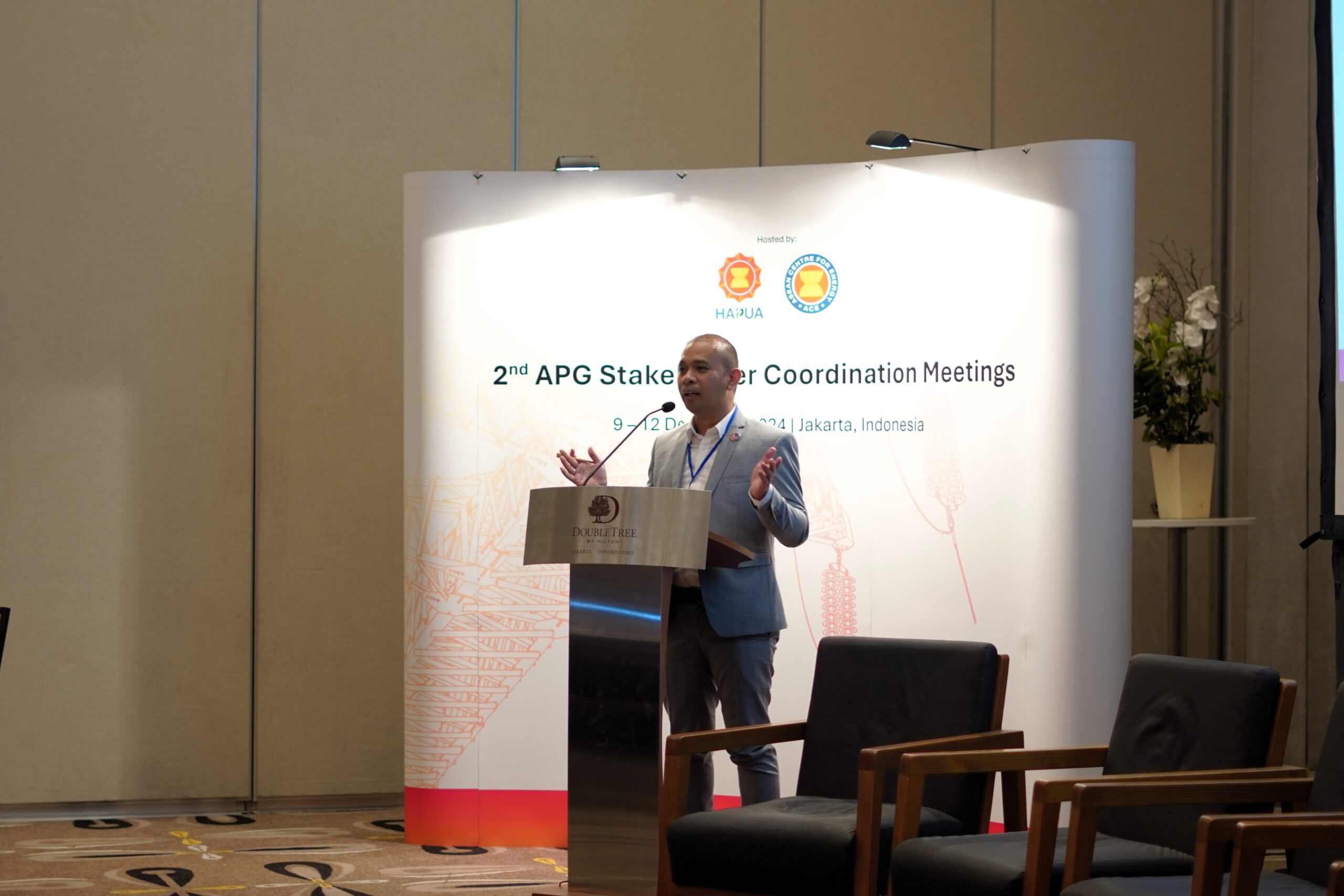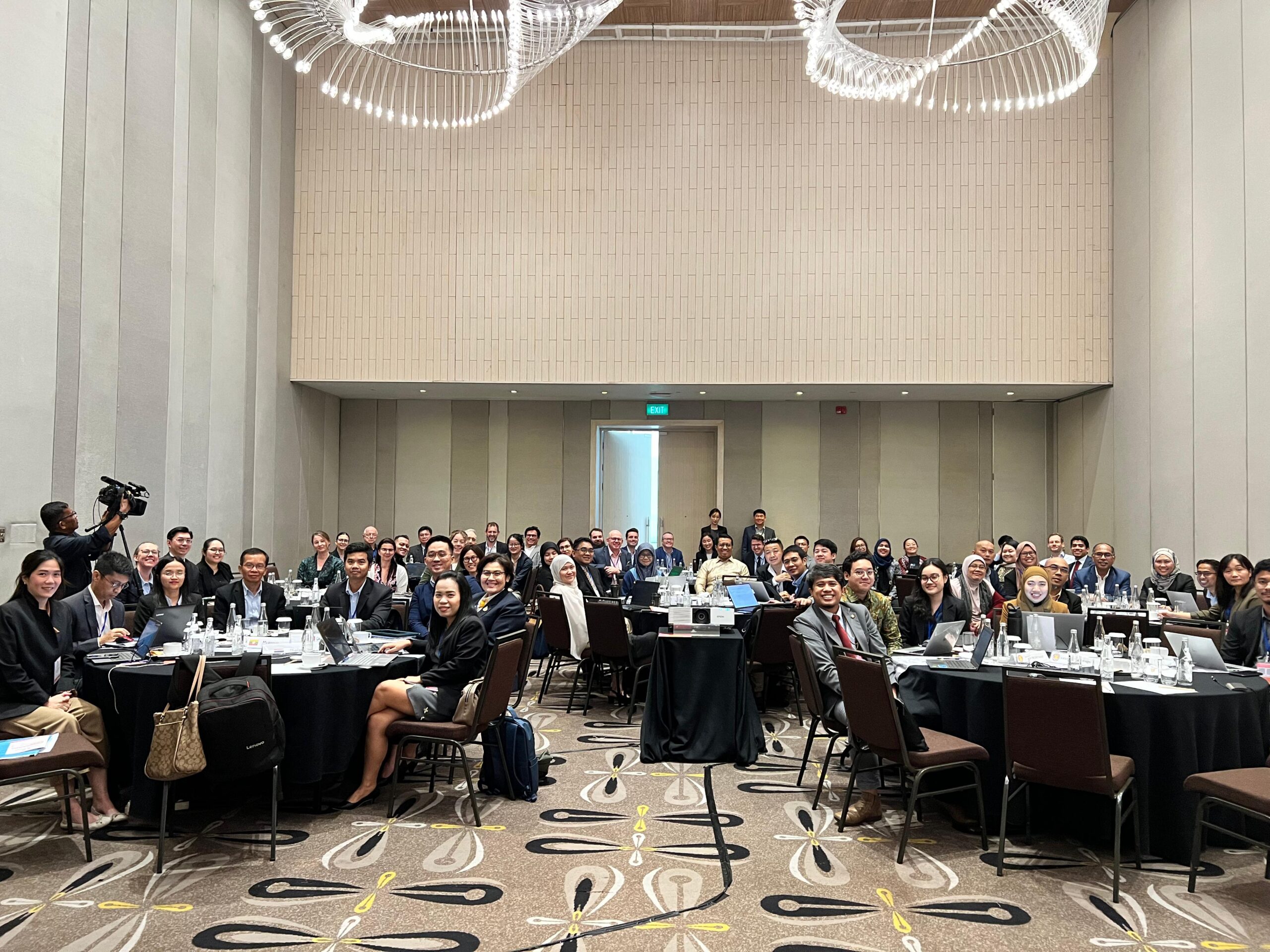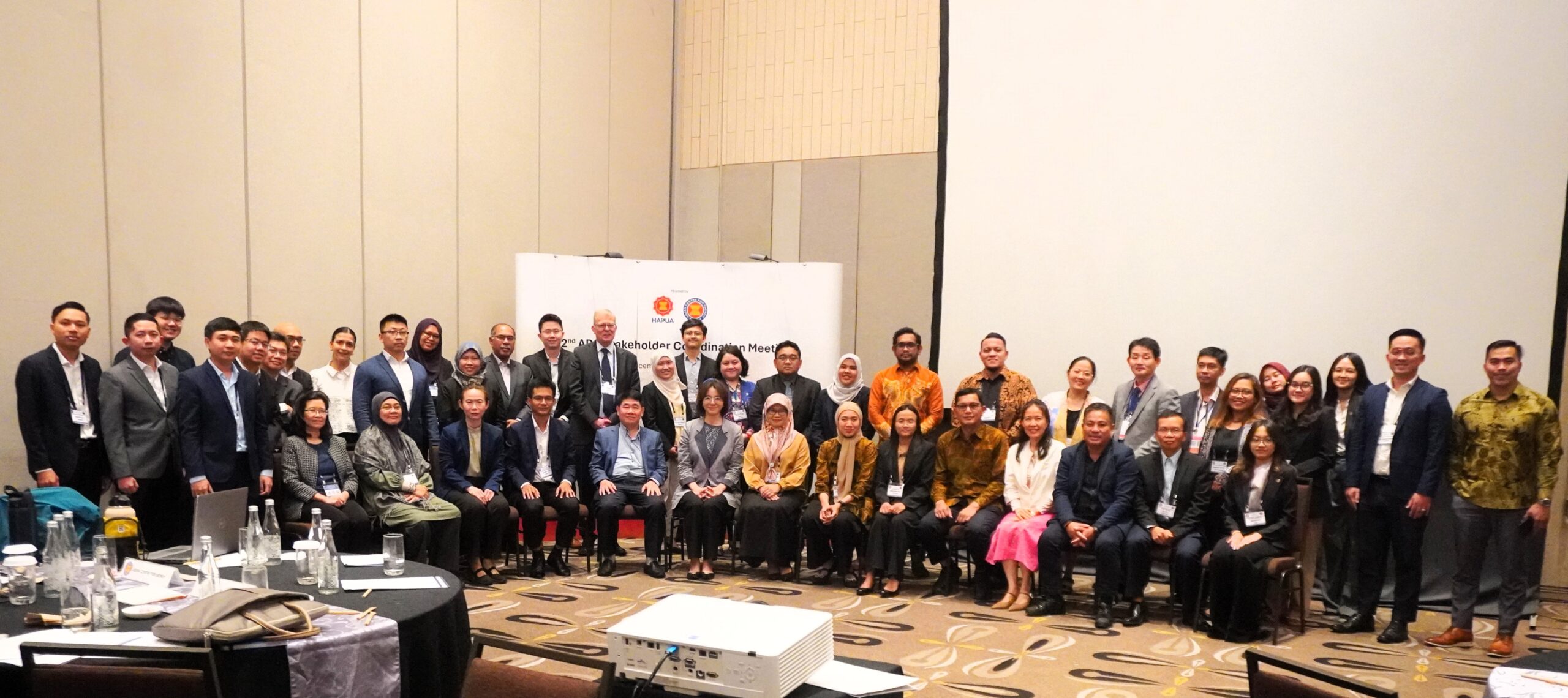Menu
Building on the momentum of this year’s progress in implementing APG milestones, The ASEAN Centre for Energy (ACE) has held the 2nd APG Stakeholder Coordination Meeting series under the ASEAN Power Grid (APG) initiative from 9 to 12 December 2024. Convened in Jakarta, Indonesia, the 2nd occurrence meeting was brought together over 100 meeting participants from nine (9) ASEAN Member States (AMS) of APG Taskforce (HAPUA, APGCC, AERN), chairs of APG-related bodies, donors and partners. Powered by a strong commitment on the development of APG, the four-day meeting discussed the AMS priorities and needs for the development of the APG with the on-going and upcoming APG related projects with existing and new cooperation partner. This meeting extends beyond to the ASEAN internal agendas, designed to discuss the enhanced APG MoU and ToR of APG Bodies and the APAEC post-2025. The objective of the four-day meeting series was to fulfil the ASEAN Plan of Action for Energy Corporation (APAEC) Programme Area No. 1: APG, which aims to gather understanding on the status and strategic way forward of the on-going and existing APG relates projects.
Day 1: 9 December 2024 – APG Stakeholders Coordination Meeting with Development Partners

Photo 1. Group Photo of the APG Stakeholder Coordination Meeting Participants
The series began with a coordination meeting, anchored by updating on APG-related activities in 2024 and the focus of APG in 2025 and beyond to explore potential avenues of cooperations. Beni Suryadi, Acting Executive Director of ACE, welcomed the meeting participants, urging AMS the need for collaboration and open discussions to gather understanding of the status and strategic way forward of the APG embodied in APAEC Phase II 2021-2025. H.E. Satvinder Singh, Deputy Secretary-General of ASEAN for ASEAN Economic Community, also delivered a remark, welcomed the participants and all interested development partners to use the meeting to discuss potential collaboration on the APG. H.E. Satvinder Singh echoed the importance of this meeting by highlighting the how pivotal is advancing APG in supporting ASEAN Economic Community Vision Post 2045 where it indicates that region interconnectivity is the driver for the region’s economic growth.

Photo 2. Opening remarks by Beni Suryadi, Acting Executive Director of ACE.
The day featured key updates on the Enhanced MOU of the APG and its impact towards the development of APG in the future from Dynta Trishana Munardy, Senior Officer of APAEC Department at ACE, on behalf of the APGCC Chair. Following the key directions on 27th APGCC Meeting and 41st SOME/AMEM in 2023, Dynta reiterated ACE and ASEAN Secretariat’s task under the APG MOU, which assigned to prepare a detailed timeline for its way forward and to provides a detailed APG Bodies’ roles to be reflected in a reference document (TOR). The subsequent session, representatives from HAPUA Working Group (HWG), Rachmanoe Indrato (HWG-1), Dr Titiporn Sangpetch (HWG-2), Liu Yao (HWG-3), Manuel Luis B. Plofino (HWG-4), Siti Nur Aisyah Khan binti Abdullah (HWG-5) shared insights on each key milestones of 2024 and the way forward in 2025 of working group.
In the next session, Nadhilah Shani, Senior Research Analyst on Power at ACE, presented the APG-related projects in 2024 and the way forward. The information shared in the session provided transparency and detail of each project with existing partners to ensure efficient resource, avoid redundancy of effort, and potential cross-collaboration among partners. Notable partners which provided the slot to share in the session are Sudhesna Ghosh Banerjee (World Bank), Keiju Mitsuhashi (ADB), John Bruce Wells (USAID SPP), Dr Gu Hongbi (CREEI), Dimas Fauzi (ETP UNOPS), Sascha Oppowa (CASE), Matthew Wittenstein (UN ESCAP) and Bethany Speer, (G-PST – NREL) (online).
In the next session featured distinguished figures from Mission to ASEAN, Thibaut Portevin (EU), Anna de Palma (UK), Lara Franzen (Australia), and engaged partners such as Jean-Pierre Marcelli (AFD – online), Matthew Wittenstein (UNESCAP), Nozomu Ono (JICA), Marcus Stewart (GGI), along from the International Organisations (IOs), Jennifer Chen (ACEC), shared their perspectives and initiatives aligning with the APG’s-related projects. Moderated by Tung Phuong, Senior Officer of APAEC at ACE the panel explored insights and partnerships on financial mechanisms and regulatory strategies to reinforced ASEAN’s commitment to propel the APG towards realising its full potential.
This collaborative session within the APG-related bodies and stakeholders successfully converged interests and potential partnerships, paving the way for exploring ASEAN opportunities in cross-border collaboration, strategic investments and knowledge sharing on the third day of the event.
Day 2: 10 December 2024 – ASEAN Internal Meeting

Photo 3. Group Photo of the AMS, ACE and ASEAN Secretariat.
The second day discussed several ASEAN Internal agendas, including the enhanced APG MoU and ToR of APG Bodies and the APAEC post-2025. Beni Suryadi commenced the day, expressing hope to have a constructive discussion among AMS to discuss internal agenda related to the APG such as APG MoU renewal, APG Program area in APAEC Post 2025 agenda, and ToR of subsea cable development framework. Followed by remarks from Dir. Irma C. Exconde as the APGCC Chair, Director of Electric Power Industry and Management Bureau of the Department of Energy, APGCC Chair (Philippines) express hope for valuable insights and recommendations gathered from the APG Taskforce during the internal meeting.
The meeting began with discussion on the 1st internal agenda which is the discussion on APG MOU finalization and ToR of APG Bodies, chaired by Beni Suryadi, Acting Executive Director of ACE. The next agenda is the discussion on proposed APG Program Area key strategy and action plan in APAEC post 2025, which is co-delivered by Dynta Trishana Munardy, Senior Officer of APAEC and Nadhilah Shani, Senior Officer of PFS Department. The agenda followed by internal agenda on discussion and updates on the development of ToR of subsea cable framework. The meeting focused on discussion of the latest draft APG MoU to seek final feedback and input from AMS and ASEAN Secretariat.
Day 3: 11 December 2024 – APG Workshop & Knowledge Sharing

Photo 4. Group Photo of the APG Workshop & knowledge sharing participants
The third day gathered back DPs/ IOs and APG Taskforce to disseminate APG-related project study output and discuss topics relevant to the APG based on the worldwide experiences. The meeting began with remarks from Tung Phuong, Senior Officer of APAEC at ACE, underscored today’s knowledge sharing session as a cornerstone of collaboration in advancing the APG, recognising that APG is more than an initiative but also a critical path to enhancing energy security, promoting sustainability, and fostering resilience across ASEAN. He noted that this particular focus aligns ASEAN’s goals under APAEC, which emphasises regional integration and collaboration.

Photo 5. Tung Phuong, Senior Officer of APAEC at ACE, delivered opening remarks (left); Prihastya Wiratama, Project Manager at ACE presented the FS of Indonesia-Malaysia Cross-border Interconnection Project (right)
The first session consisted of a sharing session from representative of seven (7) AMS, where they not only gave a brief but concise update on the status of cross-border interconnections and power trading projects in their respective countries.
Moving onto the next session, the discussion focused on the pathways towards Multilateral Power Trade (MPT) in ASEAN featured Dimas Fauzi (ETP-UNOPS), Nadhilah Shani, Senior Research Analyst on Power at ACE.
The subsequent session accentuated key building blocks for enabling cross-border trading and MPT development in ASEAN which was divided into three (3) sub-sessions topics. The first sub-session focused on infrastructure development, which include a sharing from several speakers which Prihastya Wiratama, Project Manager at ACE who shared insight of FS Indonesia-Malaysia Cross-border Interconnection Projects and Maytiwan Kiatgrajai (USAID SPP) who presented a strategic framework for subsea cable development drew an importance of technical and regulatory alignment.

Photo 6. (left-right) Panel discussion featuring experts by Veronica Ayu Pangestika Associate Research Analyst of SRE at ACE, Yang Xueqian (CREEI), Roble Velasco-Rosenheim (SuSca Group) (online), and, moderated by Reza Edriawan, Project Officer of APAEC.
The second topic outlined policy & regulatory framework focusing on the role of policies, regulatory frameworks, and initiatives in advancing RE exchange through MPT under the APG. Reza Edriawan, Project Officer of APAEC, moderated this panel discussion featured John M Garvey (USAID SPP), Roble Velasco-Rosenheim (SuSca Group) (online), and Veronica Ayu Pangestika, Associate Research Analyst of Sustainable and Renewable Energy (SRE) Department at ACE and Yang Xueqian (CREEI) to explored into role of wheeling charges and data sharing as the enablers of MPT, while also supporting the regional renewable energy certificate (REC).
Before moving onto the last sub-session which delve into financing, Hyunjung lee, Senior Energy Economist of ADB shortly briefed AMS with the concept of shadow trading and its role in accelerating MPT as the main topic for the next-day workshop. The third sub-session featurerd Bertrand Poche (AFD) and Dani Robertson (Australian Mission to ASEAN) shared insights on financing aspect towards bankable APG projects who shared the lesson learned from the Balkan Peninsula in Albania and Australian grid development. Discussions culminated on technical, regulatory, financing, political, and governance aspects to accelerate APG.
The last session wrapped up with a closed-door meeting amongst AMS, partners and consultants as part of APG-AP project consultation which involved a facilitated a roundtable discussion on the pilot initiative to enhance MPT in ASEAN.
Day 4: 12 December 2024 – Shadow Trading Workshop (co-hosted by ACE and ADB)

Photo 7. Group Photo of the Shadow Trading Workshop participants
The last day aimed to discuss the concept of shadow trading and the expectations, preliminary identifications and the next step of market designs co-hosted by ADB. The workshop began with remark from Hyungjung Lee, Senior Energy Economist of ADB. Lee introduced the concept of Shadow Trading that enables market participants to gain insight into the operation of a regional market. She highlighted its objectives by addressing technical, regulatory, and operational gaps, and its role in enabling multilateral power trade within the ASEAN framework. Jonathan Hedgecock and Hans-Arild Bredesen (ADB Consultant), continued to deeper dive on the operation of Shadow Trading and shared global best practices, including experiences from South Africa’s Southern African Power Pool (SAPP) and Europe’s energy trading systems.
The next session interspersed with two facilitated discussions with an interactive roundtable from the AMS, Great Mekong Subregion (GMS) countries and stakeholders which discussed their views and experiences of cross-border power trade, challenges and opportunities of regional day ahead power trading. Topic included such as legal and regulatory prerequisites and the approvals that will be required at utility and country level to support regional power trading and the Shadow Trading program.
Nadhilah Shani, concluded the four-day discussions by outlined the next steps for AMS Regional Power Market (RPM) development in the APG Roadmap and minimum requirements for MPT in ASEAN. Shani emphasised data collection through consultations to address gaps in cross-border interconnections, trade agreements, and regulatory frameworks to support the phased development of MPT and RPM under the APG.
ACE actively collaborates with key APG stakeholders to strengthen the APG development as one of the important pathways under the APAEC framework to accelerating sustainable and inclusive energy transition in ASEAN. This year meeting series is possible to be conducted by the support from the United States Agency for International Development (USAID) Southeast Asia Smart Power Program (SPP)) and the United Nations Economic and Social Commission for Asia and the Pacific (UN-ESCAP), the Southeast Asia Energy Transition Partnership of the United Nations Office for Project Services (ETP-UNOPS) and the Clean, Affordable, and Secure Energy (CASE) for Southeast Asia. One of the event was also co-hosted by the Asian Development Bank (ADB).
